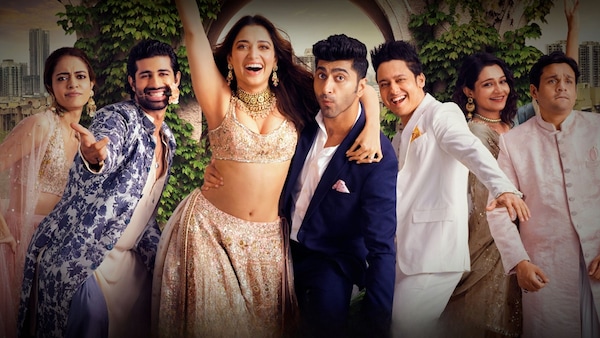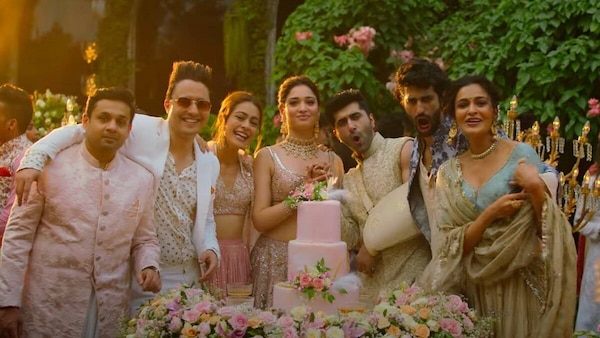Newsletter | Jee Karda: A Jaded Take On Sex & Adulting In The City
This is #CriticalMargin, where Ishita Sengupta gets contemplative over new Hindi films and shows. Today: Jee Karda on Amazon Prime Video.

Last Updated: 02.00 PM, Jun 15, 2023
This column was originally published as part of our newsletter The Daily Show on June 15, 2023. Subscribe here. (We're awesome about not spamming your inbox!)
***
ARUNIMA Sharma’s Jee Karda is a specific kind of a bad show. The eight-episode series, revolving around seven 30-something childhood friends navigating life, is so bad that it not only alienates you from caring about the characters but also makes you indifferent towards them. The series first disappoints, then makes you mad and later triggers a meltdown where you look away from the screen, hoping for something — anything — to save you from whatever that is unfolding on screen. Sharma’s show is that specific kind of bad which fills you with rage, making you feel like a bad person. When, in fact, all you wanted was to like it.
A group of adults learning the ropes of adulthood in a crowded metropolis is as tired as tested premises go. When the setting happens to be Mumbai, the weariness gets only more pronounced. The conflicts feel familiar, the problems are jaded. But there is an undeniable sentimentality to witnessing urban loneliness and companionship in a city that has place for all but space for none. Milind Dhaimade’s Tu Hai Mera Sunday (2017) comes to mind, an affecting film that outlines the ways in which the city defines relationships and, in turn, gets defined by them.
Jee Karda is no Tu Hai Mera Sunday. The show does not possess the sobering intent of the film. It also does not need to. Sharma’s series is a chaotic, loud reflection on the stifling state of existence in Mumbai coupled with the messiness of growing up as seven childhood friends negotiate intimacy, abuse, loneliness in a city they call their own. The problem with Jee Karda is manifold, the most pressing one being it unravels with such emotional ineptitude that it progressively ends up making a mockery of everything it chooses to depict.
The first two episodes are harmless. The show opens in 2007 when seven precocious school kids meet a face reader who makes various predictions, cautioning each to be scared of something or someone. He then halts at a young girl and tells her to beware of the year 2022. Jee Karda then promptly shifts to 2022. A wedding anniversary celebration is underway. His prophecies haven’t come true yet but the imminent narrative tension is relayed through quick snapshots of all the characters breaking down. Something is about to go amiss but perhaps not on that day. The joy in the air is infectious. The couple celebrating their three years together look happy. In a refreshing swerve, the man endorses marriage to his other male friends. He is so cheerful that one of them, drunk out of his mind, proposes to his long-time girlfriend. Celebrations end in festivities.
Granted these last for a short time but there is a sweetness to the proceedings. The hitched couple waking up with a hangover the next day unsurely pleased about what they have done, a woman telling a man not to go down on her because “it’s a jungle out there”, a drunk rockstar accidentally live streaming himself while having sex with someone and later being confronted by his mother who innocently wonders why he was making those animal noises… It helps that it is Dolly Ahaluwalia making that query.
To be fair, there were thematic red flags all along. The group is conveniently secular comprising a Muslim guy Shahid (Hussain Dalal), a Christian queer man Melroy (Sayan Banerjee), a Punjabi rockstar Arjun (Aashim Gulati), a Gujrati couple Sameer and Sheetal (Malhar Thakar and Samvedna Suwalka). among the rest. The year is 2022, well into a time when religious divisiveness is not just rampant but has entered our daily conversation. And yet, the underpinning of their conflicts and conversations is so apolitical that the diversity reveals itself to be synthetic, resulting in nothing. They refer to each other only as “bro” as if they consume avocado toast for breakfast and Instagram reels for dinner. In more ways than one, this superficial tokenism is reminiscent of another 2023 show Taaza Khabar, written by Hussain and Abbas Dalal (incidentally also the writers of Jee Karda with Sharma; Homi Adajania has co-directed two episodes with her). The troubling bit is it only gets worse.
Post episode three, interpersonal problems come to the fore. Sheetal lives with her in-laws and the crowded house provides no space for her to have sex with her husband, Sameer. Shahid, being not as well off as the rest, feels like a constant misfit in the group. He is a school teacher but his students make fun of him. Melroy’s partner does not acknowledge him in public. The couple who got engaged in the first episode — Lavanya and Rishabh (Tamannaah Bhatia and Suhail Nayyar) — are childhood sweethearts who have been living together for four years. Yet, as their wedding dates approaches, their opinions start colliding. He is the “nice guy” who finds it difficult to stand up for her before his parents. Having grown up with a daring mother (Simone Singh) who keeps taking chances in love and getting heartbroken, Lavanya prefers stability to love and has been with one person all her life. Rishabh is a safe bet and the realisation dawns on her, with each passing day. A fatherless Arjun stumbles across the truth about his birth. And then there is Preet (Anya Singh), a counsellor whose own life is a mess.
Notwithstanding the predictability of the premise, there was sufficient scope to craft an affecting story about friendships. That there exists an overachiever in the cluster, with ample social currency to spare, also lent room to delve into the many ways even the most unconditional relationships can become transactional with time. There are tiny suggestions, like when Sheetal, who runs a neighbourhood boutique, asks Arjun to tag her. Or when Shahid seeks his help to impress a girl he has a crush on, who also happens to be a fan. There is also a lovely scene when all the friends sit together and Preet asks Arjun if he has checked her story and he, after vehemently agreeing, starts following her on Instagram. It doesn’t escape her.

But Jee Karda is neither interested in nor equipped to explore these quieter moments. Instead the series hurtles with a vacuous sense of purpose with no patience for stillness. Across the episodes, the series focuses on the characters only when they are on the brink of doing something and includes scenes only when they preempt some event. In one single episode, an abusive couple breaks into a fight as one partner physically hurts the other, someone’s mother has a breakup, the person who was injured gets admitted to the hospital, he also escapes the hospital, someone’s proposal gets rejected and someone meets with an accident. The storytelling is always busy, jumping from one person to the other like a hyperactive child unable to sit still. This urgency causes dual consequences. One, the show’s propensity to move from one conflict to another results in simplified resolutions or sometimes, none at all. For instance at Lavanya and Rishabh’s sangeet ceremony, when the “cool” Simone Singh dances, the groom’s family takes offense. A fight ensues and Lavanya (justifiably) lashes out at them. In the next scene when they meet, everyone behaves like nothing happened. Or, when Sameer asks Sheetal to come to the loo to have sex and she refuses, the moment just evaporates like it never existed.
Jee Karda’s preoccupation with drama also manifests in the series taking broader themes like yearning for intimacy or dealing with childhood trauma, and reducing them to spectacles. Sex is both a coping mechanism and a persistent problem in the series. Physicality is always the chosen language to portray urban solitude but Sharma also stops short of underlining the vacuity of the act when performed to fill a lack. Instead, it becomes a punchline. All three times I have looked away from the screen for seconds to drink water, a man came in the car, a man came too soon and a man was unable to come. Fundamentally, this is bad filmmaking where every little narrative inflection is included with the expressed purpose of drawing actions and not just reactions. As an extension, the performance of the characters overwhelmingly feels like they are aware of the camera’s presence. They cry under the shade of neon lights, make out in soft yellow lighting, and break down before a mirror like all of them are in some long, unending Prateek Kuhad music video.
I reckon that was the intent, for nothing else explains the literal background songs that punctuate every emotion. For instance when a couple makes out after a fight, the song goes something like this: “Why don’t you hold me, love/With thoughts in your head”. Later when the friends are laughing, the song that accompanies the moment is this: “Youth will pass us by/the moment is all we have to get to live our friendship. When a character is sad, this is the song that floats: “I am angry with myself/Who do I complain to/The fault is mine”. You get the drift. The underlying idea here is a bunch of characters feeling things to tell us, ‘look we are feeling things’. I was almost waiting for someone to reveal that all of this was for an Instagram reel.
Granted this specific brand of filmmaking is an extension of Four More Shots Please!, one of the most popular shows on Amazon Prime. But it could pass off then because back in 2019 when the first season dropped, storytelling in streaming was not as consummate as it is now. And moreover, for a show which centers on something as intimate as female friendships, a large part of its watchability hinges on relatability. In such a case, this treatment of creating a vibe for each moment works because the “plot” as it were is anyway familiar.
In comparison, Jee Karda is just a bad show. The flashbacks are poorly placed, the city is generically shot (Mahendra Shetty is the cinematographer). But more crucially, it is bad in the way that it is a dishonest series which claims to depict emotions it has no bandwidth to even recognise without moody lighting. Towards the conclusion, a confrontation scene ends with a pub, filled with people, catching fire. I have never been more pleased with an ending. This counts for a spoiler, you say? Nothing can spoil a show already this spoiled.

